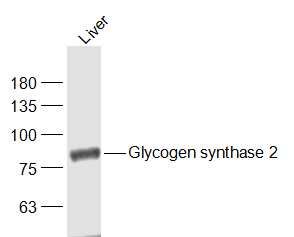Glycogen synthase 2 Polyclonal Antibody
Purified Rabbit Polyclonal Antibody (Pab)
- SPECIFICATION
- CITATIONS
- PROTOCOLS
- BACKGROUND

Application
| WB, IHC-P, IHC-F, IF, E |
|---|---|
| Primary Accession | P54840 |
| Reactivity | Rat, Pig, Dog |
| Host | Rabbit |
| Clonality | Polyclonal |
| Calculated MW | 81 KDa |
| Physical State | Liquid |
| Immunogen | KLH conjugated synthetic peptide derived from human Glycogen synthase 2 |
| Epitope Specificity | 621-703/703 |
| Isotype | IgG |
| Purity | affinity purified by Protein A |
| Buffer | 0.01M TBS (pH7.4) with 1% BSA, 0.02% Proclin300 and 50% Glycerol. |
| SIMILARITY | Belongs to the glycosyltransferase 3 family. |
| Post-translational modifications | Primed phosphorylation at Ser-657 (site 5) by CSNK2A1 and CSNK2A2 is required for inhibitory phosphorylation at Ser-641 (site 3a), Ser-645 (site 3b), Ser-649 (site 3c) and Ser-653 (site 4) by GSK3A an GSK3B. Dephosphorylation at Ser-641 and Ser-645 by PP1 activates the enzyme (By similarity). |
| DISEASE | Defects in GYS2 are the cause of glycogen storage disease type 0 (GSD0) [MIM:240600]; A metabolic disorder characterized by fasting hypoglycemia presenting in infancy or early childhood, high blood ketones and low alanine and lactate concentrations. Although feeding relieves symptoms, it often results in postprandial hyperglycemia and hyperlactatemia. |
| Important Note | This product as supplied is intended for research use only, not for use in human, therapeutic or diagnostic applications. |
| Background Descriptions | Glycogen synthase catalyzes the rate-limiting step in glycogen synthesis. Its activity is regulated by a complex phosphorylation-dephosphorylation mechanism and by allosteric stimulators and inhibitors. Two isozymes of synthase, a skeletal muscle type (Glycogen synthase 1 - GYS1) and a liver type (Glycogen synthase 2 - GYS2), have been identified. |
| Gene ID | 2998 |
|---|---|
| Other Names | Glycogen [starch] synthase, liver, 2.4.1.11, GYS2 |
| Dilution | WB=1:500-2000,IHC-P=1:100-500,IHC-F=1:100-500,IF=1:100-500,ELISA=1:5000-10000 |
| Format | 0.01M TBS(pH7.4), 0.09% (W/V) sodium azide and 50% Glyce |
| Storage | Store at -20 ℃ for one year. Avoid repeated freeze/thaw cycles. When reconstituted in sterile pH 7.4 0.01M PBS or diluent of antibody the antibody is stable for at least two weeks at 2-4 ℃. |
| Name | GYS2 {ECO:0000303|PubMed:9691087, ECO:0000312|HGNC:HGNC:4707} |
|---|---|
| Function | Glycogen synthase participates in the glycogen biosynthetic process along with glycogenin and glycogen branching enzyme. Extends the primer composed of a few glucose units formed by glycogenin by adding new glucose units to it. In this context, glycogen synthase transfers the glycosyl residue from UDP-Glc to the non-reducing end of alpha-1,4-glucan. |
| Tissue Location | Specifically expressed in liver (at protein level). |

Thousands of laboratories across the world have published research that depended on the performance of antibodies from Abcepta to advance their research. Check out links to articles that cite our products in major peer-reviewed journals, organized by research category.
info@abcepta.com, and receive a free "I Love Antibodies" mug.
Provided below are standard protocols that you may find useful for product applications.
If you have used an Abcepta product and would like to share how it has performed, please click on the "Submit Review" button and provide the requested information. Our staff will examine and post your review and contact you if needed.
If you have any additional inquiries please email technical services at tech@abcepta.com.













 Foundational characteristics of cancer include proliferation, angiogenesis, migration, evasion of apoptosis, and cellular immortality. Find key markers for these cellular processes and antibodies to detect them.
Foundational characteristics of cancer include proliferation, angiogenesis, migration, evasion of apoptosis, and cellular immortality. Find key markers for these cellular processes and antibodies to detect them. The SUMOplot™ Analysis Program predicts and scores sumoylation sites in your protein. SUMOylation is a post-translational modification involved in various cellular processes, such as nuclear-cytosolic transport, transcriptional regulation, apoptosis, protein stability, response to stress, and progression through the cell cycle.
The SUMOplot™ Analysis Program predicts and scores sumoylation sites in your protein. SUMOylation is a post-translational modification involved in various cellular processes, such as nuclear-cytosolic transport, transcriptional regulation, apoptosis, protein stability, response to stress, and progression through the cell cycle. The Autophagy Receptor Motif Plotter predicts and scores autophagy receptor binding sites in your protein. Identifying proteins connected to this pathway is critical to understanding the role of autophagy in physiological as well as pathological processes such as development, differentiation, neurodegenerative diseases, stress, infection, and cancer.
The Autophagy Receptor Motif Plotter predicts and scores autophagy receptor binding sites in your protein. Identifying proteins connected to this pathway is critical to understanding the role of autophagy in physiological as well as pathological processes such as development, differentiation, neurodegenerative diseases, stress, infection, and cancer.


